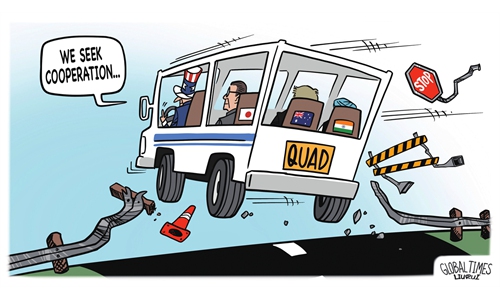
Illustration: Liu Rui/GT
In 1971, Gough Whitlam shocked the Australian political circle with his whirlwind visit to China as the opposition party leader. That visit, later called "a stroke of genius," led to Australia's judicious recognition of the People's Republic of China and the prompt establishment of formal diplomatic relations between the two countries in the following year after he took the office of prime ministership in Canberra. In the 50 years that passed, bilateral relations between China and Australia have grown and developed into a comprehensive strategic partnership, "a successful story of friendship and cooperation … (which) has been mutually beneficial," in the words of China's ambassador to Australia, Xiao Qian.China's momentous development has benefited from proactive cooperation with Australia in various areas, in particular, economically and socially. Moreover, people-to-people exchanges have contributed to cultural diversity and dynamism in both countries.
However, the previous Liberal-National Coalition government of Australia stunned the world in recent years by vigorously spearheading the anti-China campaign launched by Washington in order to maintain and strengthen the hegemony of the US in the Asia-Pacific region and the world. The constructive and productive relationship between the two countries was devastated by the Turnbull and Morrison administrations for the sake of their allegiance to the US, with no regard of Australia's own long-term national interests. The bilateral relationship has now spiralled downward to an all-time low, with the alarming prospect of a possible total breakdown as Canberra started to make frequent threats of war with China.
Since the new Labor government took office after winning the federal parliament election in May this year, Canberra has demonstrated a noticeably different outlook and approach in Australia's foreign policies. The new prime minister, Anthony Albanese, has been expressly articulating his opposition to the previous government's unnecessary and extremely toxic hostility toward China. Ministerial level dialogues have resumed, leading up to the ground-breaking meeting between President Xi Jinping and Albanese during the G20 summit in mid-November, which, as Australia's Foreign Minister Penny Wong commented, signifies "an important step toward the stabilization of our relationship." Australian ambassador to China, Graham Fletcher, sanguinely predicted that "step-by-step discussions on consular matters, defense, trade, education, movement of people, investment, law enforcement and the economy" will proceed to return to their normalcy.
With the spirit of equal positivity, China is willing to work with Australia proactively to steer the bilateral relationship back to the right track, which will definitely benefit both countries and peoples, in particular against the background of post-COVID economic recovery.
China is the biggest destination for Australia's mineral and energy exports. Australian-made high quality food and diary products are top of the shopping list for Chinese consumers, while students and tourists here have already been making plans for education and holiday-making in Australia with the imminent easing of COVID restrictions on international travel.
While there are undeniably various differences in the political systems, social governance and cultures between our two countries, there are more importantly convergence of interests and common ground upon which we are able to pursue a more constructive and productive partnership.
There are, however, still some adverse undercurrents in Australia which are resistant to the ongoing efforts on both sides to reset and improve the bilateral relations. Some negative elements have been acting at the behest of the anti-China forces in the US to pose as hindrances to the tide of history. From time to time, they collude to provoke confrontation and challenge China's core national interests. The recent visit by some Australian members of Parliament to Taiwan island is apparently one of such deleterious attempts to sabotage the Albanese government's efforts to stabilize its relationship with China.
It is therefore important for the Australian government to be vigilant, and to manifestly resist such vile conspiracies. At the prospect of the warming up of the bilateral relations, Canberra needs to contribute by putting in more firewood, instead of dampening the warmth by tolerating or even encouraging any harmful or damaging attempts.
It is therefore worthwhile for us to appreciate the foresight and wisdom of Whitlam when he said during his visit to China in 1973 that "there are great benefits for all in putting aside the rigidities and animosities of the Cold War era and grasping the opportunities inherent in the more open framework of relationships now developing in the world, to build a structure of cooperation based on mutual respect and mutual trust."
The author is president of the Chinese Association of Australian Studies and director of the Australian Studies Centre at East China Normal University. opinion@globaltimes.com.cn



